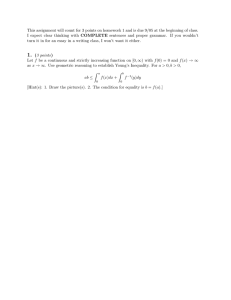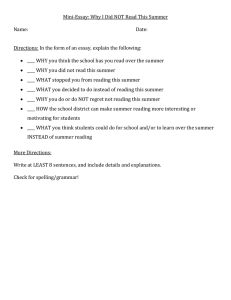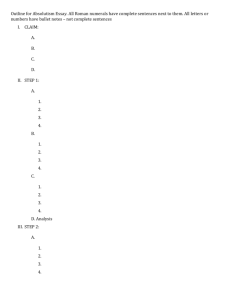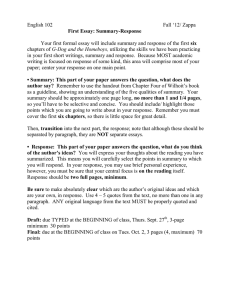LW0346chsyl-3-.doc
advertisement
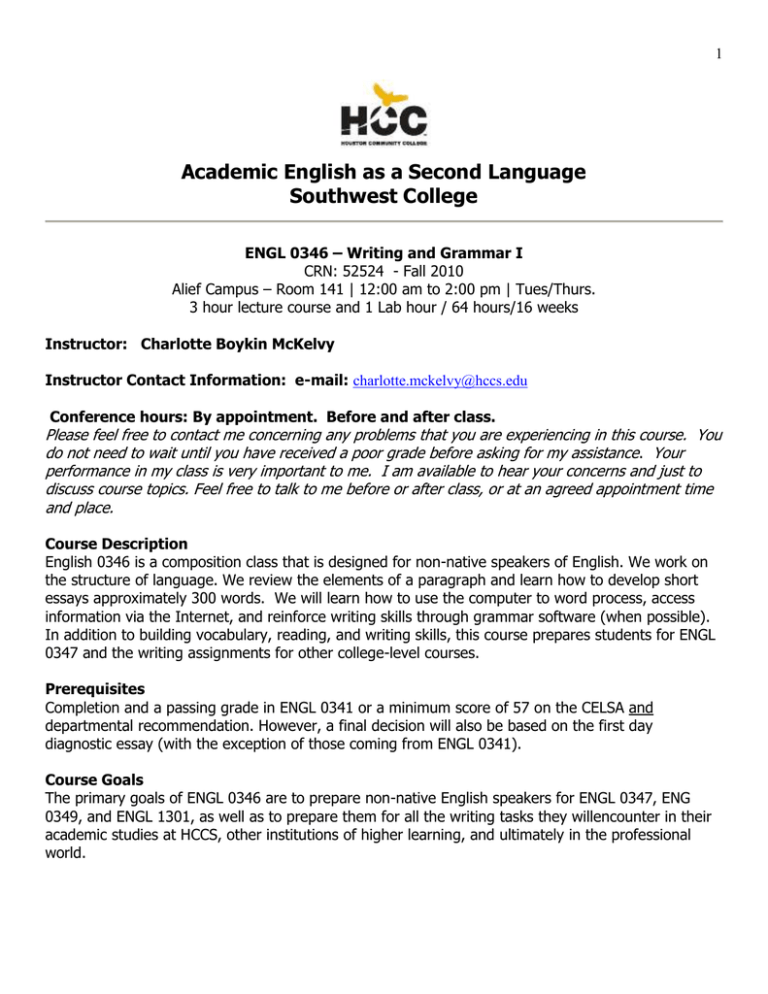
1 Academic English as a Second Language Southwest College ENGL 0346 – Writing and Grammar I CRN: 52524 - Fall 2010 Alief Campus – Room 141 | 12:00 am to 2:00 pm | Tues/Thurs. 3 hour lecture course and 1 Lab hour / 64 hours/16 weeks Instructor: Charlotte Boykin McKelvy Instructor Contact Information: e-mail: charlotte.mckelvy@hccs.edu Conference hours: By appointment. Before and after class. Please feel free to contact me concerning any problems that you are experiencing in this course. You do not need to wait until you have received a poor grade before asking for my assistance. Your performance in my class is very important to me. I am available to hear your concerns and just to discuss course topics. Feel free to talk to me before or after class, or at an agreed appointment time and place. Course Description English 0346 is a composition class that is designed for non-native speakers of English. We work on the structure of language. We review the elements of a paragraph and learn how to develop short essays approximately 300 words. We will learn how to use the computer to word process, access information via the Internet, and reinforce writing skills through grammar software (when possible). In addition to building vocabulary, reading, and writing skills, this course prepares students for ENGL 0347 and the writing assignments for other college-level courses. Prerequisites Completion and a passing grade in ENGL 0341 or a minimum score of 57 on the CELSA and departmental recommendation. However, a final decision will also be based on the first day diagnostic essay (with the exception of those coming from ENGL 0341). Course Goals The primary goals of ENGL 0346 are to prepare non-native English speakers for ENGL 0347, ENG 0349, and ENGL 1301, as well as to prepare them for all the writing tasks they willencounter in their academic studies at HCCS, other institutions of higher learning, and ultimately in the professional world. 2 Course Objectives Students will be able to: 1. apply the principles of writing as a process, including pre-writing and invention strategies, drafting, revising, and editing to multiple drafts. 2. write a minimum of four compositions, at least two of which are short essays, and a final essay. 3. produce paragraph(s) of 100-150 words and short essays of at least 300 words in which they apply the following patterns of development: description, chronological order or details, supporting an opinion, and exemplification. 4. demonstrate competency with topic sentences, supporting, and concluding sentences of a single-paragraph composition as well as the thesis, at least one body paragraph, and a conclusion paragraph for the short essay. 5. correctly identify and use the main parts of speech in complete sentences: nouns, verbs, adjectives, adverbs, articles, and prepositions, and common coordinating conjunctions (and, but, so ). 6. achieve competency with the following grammar: verb tenses, count and non-count nouns, noun modifiers, word forms, articles, prepositional phrases, and the common coordinating conjunctions. 7. produce the three types of simple sentences with transitive and intransitive verbs and basic compound sentences with and, but, so accurately. Learning objectives Students will: 1. Apply the principles of writing as a process. 2. Adopt the paragraph and short essay structure. 3. Differentiate among rhetorical styles. 4. Demonstrate knowledge of basic grammar usage and structure in simple and compound sentences. 3 Instructional Materials Focus on Grammar: A High-Intermediate Course for Reference and Practice, by Margorie Fuchs and Margaret Bonner; 3rd ed. (Required) (ISBN 0-13-190009-9) Focus on Grammar High-Intermediate Workbook: An Integrated Skills Approach (Workbook) by Fuchs and Bonner; 3rd ed. (Required) (ISBN 0-13-191235-6) Collins Cobuild dictionary (recommended) Note: Students will not be permitted the use of any electronic devices during exams. This includes electronic translation machines. Pens (blue or black), a pencil, an eraser, and a stapler 6 Scantrons A 1” ring binder to be used only for this course containing: Lined paper (standard size-8.5 by 11 inch); All previous handouts All homework assignments All graded work A thin (one-course) spiral notebook (letter size – 8x10) for journal assignments. 4 ENGLISH 0346 16-Week Course Calendar, Fall 2009 (This is a tentative calendar that may change to meet the needs of the class.) Textbooks: Focus on Grammar, High-Intermediate, by Fuchs and Bonner 4 (text) Focus on Grammar, High-Intermediate Workbook, by Fuchs and Bonner 4 (WB) All homework assignments are due the following class period. No late homework or journals will be accepted. Homework must be done on wide-lined notebook paper, in blue or black ink. Skip every other line and write on one side of the page only. Use the proper heading on ALL work turned in (see below). If I don’t know what it is, I can’t give you a grade for the work. Journals are done in your spiral notebook. Identify each entry with a date in the left margin, a journal number, and a page number (if applicable) and topic. WEEK 1 Tues. Aug. 31: Introduction to AESL program; course syllabus; diagnostic assessment. HW: 1). Study the syllabus. Expect a pop quiz over its contents. 2). Send me an email from the email address you check everyday. Write at least five sentences about yourself. This is the grade for Journal No. 1. Use the heading below for all papers you turn in. For Journals, put the date in the left side of your inside margin in your journal notebook, as well as the Journal assignment number, i.e. Journal No. 2. First and Last Name Instructor: Boykin-McKelvy English 0346 CRN # 52524 Date (i.e. Aug. 31, 2010) Coming to a New Land (or whatever your title is) Indent for the first and all paragraphs and double space (or skip every other line if handwritten). Don’t forget to indent for each paragraph. Write on one side of the page only. Thurs. Sept. 2: Review the syllabus. Continue diagnostic assessment as needed. HW: text, ex. 2, pp. 5 and 6, and ex. 3, p. 6. HW: text. Ex. 3, 4, and 5, pp. 15-16. HW: Quiz 1: The Syllabus. WEEK 2 MON. SEPT. 6: LABOR DAY HOLIDAY: NO CLASSES. OFFICES CLOSED. Tues. Sept. 7: Continue diagnostic assessment, as needed. Review the parts of speech (Nouns and Verbs). Review Units 1 and 2 text: simple and progressive present and past tenses. ****Changed to Thursday: Begin Unit 3: Simple Past, Present Perfect, Present Perfect Progressive HW: WB: pp. 15-23 (all pages) 5 Thurs. Sept. 9: Review the parts of speech (Nouns and Verbs). Review Units 1 and 2 text: simple and progressive present and past tenses. Begin Unit 3: Simple Past, Present Perfect, Present Perfect Progressive HW: Text: Journal No. 2; 10, 11, p. 40. HW: Study for Quiz 2: Units 1 and 2. WEEK 3 Tues. Sept. 14 Quiz 2: Units 1 and 2. *** Unit 4: Past Perfect and Past Perfect Progressive, including pp. 43-45. Review Units 3&4 for Quiz 3. Presentation: Descriptive Paragraph HW: Write an outline or graphic organizer for a descriptive paragraph. Thurs. Sept. 16 Hand back tests. Go over Quiz 2 in class. Finish Viewing Presentation: Descriptive Paragraphs. HW: WB: Review Test pages for Units 3 and 4. Use answer keys to check your work. WEEK 4 Tues. Sept. 21: Units 3 and 4: Past, Present and Past Perfect Make a graphic organizer (in class) for descriptive paragraph. Write C1D1 (Composition #1, Draft #1) Descriptive Paragraph. Staple your pre-writing outline or graphic organizer and your diagnostic writing profile to your comp. draft 1. HW: Finish ex. 1b, 2, 3, 4, and 5, pp. 173-177. Thurs. Sept. 23: Unit 12 Phrasal Verbs. Review Units 3 and 4. In class: Discuss with a group telemarketing. Journal No. 3: Write an opinion about telemarketing. See text Ex. 7 for ideas. HW: text: Ex. 1, pp. 181-182. Copy whole sentences and underline phrasal verbs replaced. HW: text: Review Test, pp. 184-188. WEEK 5 Tues. Sept. 28: QUIZ 2 and 3 on simple present, present progressive, past, present and past perfect and phrasal verbs (Units 3, 4 and 12). HW: Read text pp. 124-125. HW: Journal No. 4: What do you think about eating fast food. Write a paragraph on your opinion. Support your opinion with facts based on your experience or the experience of others. Thurs. Sept. 30: Begin Unit 9: Gerunds and Infinitives, including Appendix 2—6 Presentation: Opinion Essay HW: text: Ex. 2, 3, 4, 5 pp. 130-133. HW: Questionnaire handout: opinion essay. WEEK 6 Tues. Oct. 5 : Continue Unit 9 Text: Ex. 10, p. 136 (in groups of 3). Journal No. 5: Write an opinion paragraph about a social problem. HW: WB: No. 5, p. 49. Copy complete sentences and underline corrections to the mistakes. Thurs. Oct. 7: Unit 10: Causative verbs let, make, have, help, get. HW: text: ex. 1-4, pp. 141-145. 6 WEEK 7 Tues. Oct. 12: Continue on Unit 10. Group Work: text: No. 7, p. 147. Journal No. 6: Write your opinion of what teenagers should be allowed to do and not allowed to do. Use as many gerunds, infinitives and causative verbs as you can. HW: text: pp. 149-150. Thurs. Oct. 14: QUIZ 4 on gerunds, infinitives, and causative verbs HW: Write an outline for an opinion essay. WEEK 8 Tues. Oct. 19: HW: Write an outline for an opinion essay. Write C2D1, Opinion Short Essay HW: Handout on adverbial clauses. Read the explanation and do the exercises. Thurs. Oct. 21: Introduction to adverbial clauses with because and since Group Work: Discuss the experiences you had when you first came to the U.S. or lived in a new city and explain why you had these experiences. Journal No. 7: Write about an experience you had and what caused it and how you have changed since that experience. HW: Watch the powerpoint on Adverb Clauses (HCC Learning Web: Grammar) HW: Handout on adverbial clauses. (HCC Learning Web: Homework and Assignments) HW: Watch the powerpoint on Opinion Essays (HCC Learning Web: Essay Writing) WEEK 9 Tues. Oct. 26: Write C2D1, Opinion Short Essay- Topic chosen in class on Tuesday 10-21-10. Unit 16: Modal Verbs—Past Advisability Text: ex. Pp. 243-245. Finish for homework. In class: text: Ex. 7 and 8. HW: Journal No. 8: Text: Ex. 9, p. 248. HW: WB: pp. 74-81. Check from answers in workbook. Thurs. Oct. 28: QUIZ 4 all twelve tenses plus gerunds, infinitives, and causative verbs, as well as phrasal verbs. Review Units 1,2, 3, 4, 5, 6, 9, 10, 11, and 12. Bring a scantron, No. 2 pencil, eraser, notebook paper and blue or black pen. Review modal verbs. Unit 17: Modal Verbs—Past Speculations and Conclusions HW: Text: ex. 6, p. 258. HW: WB, pp. 84-86. Check from answers in workbook. WEEK 10 Tues. Nov. 2: Review of Auxiliary Verbs: be, do, have; Quiz 5 on auxiliary verbs and modals HW: Text: Read and study pp. 102-107. Do. Ex. 1, p. 108. Thurs. Nov. 4: Introduction to Compound Sentences (FANBOYS conjunctions) Continue Unit 8: so, too, neither, not either, but Introduction to the narrative essay. HW: Journal No. 9: Describe the differences between you and a family member. Describe an incident that is an example of the differences. 7 WEEK 11 Tues. Nov. 9: Quiz 5 on auxiliary verbs and modals and Compound and Simple Sentences (Units 16, 17, and 8, as well as ALL tenses). Continue Unit 8; Introduction to adverbial time clauses, pp. 79-81 HW: handout on adverbial clauses. HW: View narrative essay powerpoint. HW: Make an outline of a narrative from your own experience. Thurs. Nov. 11::Write C3D1, Narrative Short Essay HW: WB: pp. 118-121. WEEK 12 Tues. Nov. 16: Unit 23: Present Unreal Conditionals Text: pp. 341-345. HW: Journal No. 10, Text, ex. 10 or 11, p. 347. Thurs. Nov. 18: Unit 24: Past Unreal Conditionals Presentation: Short essay using examples. HW: Text: pp. 352-356 LAST DAY FOR WITHDRAWAL: NOVEMBER 18, 2010 – 4:30 P.M. WEEK 13 Tues. Nov.23: Unit 28: Indirect Questions; Unit 29: Embedded Questions HW: pp. 406-409. HW: Make an outline of a short essay using examples as support. NO CLASSES WEDNESDAY NIGHT, NOV. 24. NO CLASSES NOVEMBER 25-28.: THANKSGIVING HOLIDAYS – ALL OFFICES CLOSED. WEEK 14 Tues.. Nov. 30: Write C4D1, Short Essay using examples as support HW: WB: pp. 119-128. Thurs. Dec. 2: QUIZ 6: (Units 24 and 25) Condionals and Indirect and Embedded Questions HW: Review for final exam. WEEK 15 Tues. Dec. 7: Write the FINAL ESSAY. Bring a bluebook and a blue or black pen. Thurs. Dec. 9 Review for Final Exam (Objective). WEEK 16 THURS. Dec. 16: FINAL (GRAMMAR) EXAM. Bring a scantron and a No. 2 pencil. 8 HCC Policy Statement – ADA: Services to Students with Disabilities Any student with a documented disability (e.g. physical, learning, psychiatric, vision, hearing, etc.) who needs to arrange reasonable accommodations must contact the Ability Services Office in Room C136 West Loop Campus, or call (713) 718-7910 to make necessary arrangements at the beginning of each semester. Your instructor is authorized to provide only the accommodations requested by the office of Ability Support Services. HCC Policy Statement: Academic Honesty A student who is academically dishonest is, by definition, not showing that the coursework has been learned, and that student is claiming an advantage not available to other students. The instructor is responsible for measuring each student's individual achievements and also for ensuring that all students compete on a level playing field. Thus, in our system, the instructor has teaching, grading, and enforcement roles. You are expected to be familiar with the University's Policy on Academic Honesty, found in the HCC catalog. What that means is: If you are charged with an offense, pleading ignorance of the rules will not help you. Students are responsible for conducting themselves with honor and integrity in fulfilling course requirements. Penalties and/or disciplinary proceedings may be initiated by HCC System officials against a student accused of scholastic dishonesty. “Scholastic dishonesty”: includes, but is not limited to, cheating on a test, plagiarism, and collusion. Cheating on a test includes: Copying from another students’ test paper Using materials not authorized by the person giving the test Collaborating with another student during a test without authorization Knowingly using, buying, selling, stealing, transporting, or soliciting in whole or part the contents of a test that has not been administered Bribing another person to obtain a test that is to be administered Plagiarism means the appropriation of another’s work and the unacknowledged incorporation of that work in one’s own written work offered for credit. Copying phrases, sentences, and/or paragraphs from another person without giving credit to the source of the ideas AND cutting and pasting someone else’s work is plagiarism. This is a serious offense in college and equal to stealing. Collusion means the unauthorized collaboration with another person in preparing written work offered for credit. Possible punishments for academic dishonesty may include a grade of 0 or F in the particular assignment, failure in the course, and/or recommendation for probation or dismissal from the HCC System. (See the Student Handbook) HCC Policy Statement: Class Attendance Class Attendance - It is important that you come to class! Attending class regularly is the best way to succeed in this class. Research has shown that the single most important factor in student success is attendance. Simply put, going to class greatly increases your ability to succeed. You are expected to attend all lectures and labs regularly. You are responsible for materials covered during your absences. Class attendance is checked daily. Although it is your responsibility to drop a course for nonattendance, the instructor has the authority to drop you for excessive absences. If you are not attending class, you are not learning the information. Because the information that is discussed in class is important for your career, students may be dropped from a course after 9 accumulating absences in excess of 12.5% hours (8 hours) of instruction (F-1 students should particularly take note of this so as not to affect your visa status). The eight hours of class time would include any total classes missed or for excessive tardiness. Remember: Class attendance equals class success. HCC Course Withdrawal Policy If you feel that you cannot complete this course, you will need to withdraw from it prior to the final date of withdrawal (See your course calendar). Before you withdraw from your course, please take the time to meet with the instructor to discuss why you feel it is necessary to do so. The instructor may be able to provide you with suggestions that would enable you to complete the course. Your success is very important. Beginning in fall 2007, the Texas Legislature passed a law limiting first time entering freshmen to no more than SIX total course withdrawals throughout their educational career in obtaining a certificate and/or degree. To help students avoid having to drop/withdraw from any class, HCC has instituted an Early Alert process by which your professor can “alert” you and HCC counselors that you might fail a class because of excessive absences and/or poor academic performance. It is your responsibility to visit with your professor or a counselor to learn about what, if any, HCC interventions might be available to assist you – online tutoring, child care, financial aid, job placement, etc. – to stay in class and improve your academic performance. If you plan on withdrawing from your class, you MUST contact an HCC counselor or your professor prior to withdrawing (dropping) the class for approval and this must be done PRIOR to the withdrawal deadline to receive a “W” on your transcript. If you do not withdraw before the deadline, you will receive an F or an IP (see below) as your final grade. College Grading System: Students who have completed English 0346 and show that they are ready for the next level (ENGL 0347) with a final average of 70% or higher will receive a letter grade of A, B, or C. Students who are not ready for English 0347 may receive a grade of IP. The IP grade is not a good or bad grade; however, it means "IN PROGRESS" and requires the student to take English 0346 again because the student will benefit from another semester in 0346 to learn all of the skills that are taught in this course. However, if a student repeats 0346 after receiving one IP, a letter grade must be given (A, B, C, or F upon completing the course for the second time). Repeat Course Fee The State of Texas encourages students to complete college without having to repeat failed classes. To increase student success, students who repeat the same course more than twice, are required to pay extra tuition. The purpose of this extra tuition fee is to encourage students to pass their courses and to graduate. Effective fall 2006, HCC will charge a higher tuition rate to students registering the third or subsequent time for a course. If you are considering course withdrawal because you are not earning passing grades, confer with your instructor/counselor as early as possible about your study habits, reading and writing homework, test taking skills, attendance, course participation, and opportunities for tutoring or other assistance that might be available. Use of Camera and/or Recording Devices As a student active in the learning community of this course, it is your responsibility to be respectful 10 of the learning atmosphere in your classroom. To show respect of your fellow students and instructor, you will turn off your phone and other electronic devices, and will not use these devices in the classroom unless you receive permission from the instructor. Use of recording devices, including camera phones and tape recorders, is prohibited in classrooms, laboratories, faculty offices, and other locations where instruction, tutoring, or testing occurs. Students with disabilities who need to use a recording device as a reasonable accommodation should contact the Office for Students with Disabilities for information regarding reasonable accommodations Classroom Policies As your instructor and as a student in this class, it is our shared responsibility to develop and maintain a positive learning environment for everyone. Your instructor takes this responsibility very seriously and will inform members of the class if their behavior makes it difficult for her to carry out this task. As a fellow learner, you are asked to respect the learning needs of your classmates and assist your instructor to achieve this critical goal. To this end All cell phones, pagers, Ipods, or any other electronic devices that may cause a distraction in class must be turned off. No laptops are permitted to be used during class. You may use an electronic dictionary (hand-held) with the sound turned off. You are not permitted to leave class to answer or return calls unless it is an absolute emergency; doing so will be counted as a tardy. If a student is using a cell phone at any time during the class period, I will remind the student about the policy once. After that, I will ask the student to leave class and mark him or her absent. In addition, students are expected to arrive to class on time with ALL THEIR MATERIALS INCLUDING THE TEXT BOOKS. (You will not be permitted to share after the first week of class.) In addition, students will be marked tardy if they arrive late. Returning late from a break or leaving class early counts as being tardy. Being tardy twice will equal one absence (whether ten minutes or one hour). If you miss five classes (5 absences) you can be dropped without notification and will therefore be out of compliance if you are an F-1 student. If a student misses a class, it is his or her responsibility to see the instructor about the work that was missed. If you are absent on the day of a quiz or test, you will receive a “0” for that assignment. There are no make-up quizzes or tests, but I will drop the lowest quiz grade for every student at the end of the semester. COURSE WORK Homework The course calendar lists all of the reading, writing, grammar, and vocabulary exercises that will be done for homework. While doing all the homework and attending class is not a complete guarantee of success, it is certainly true that not doing it is a guarantee of failure. You will receive a completion grade for homework rather than a number or letter grade. At the end of the semester, you will receive a numerical grade for the total number of homework assignments that you complete. The purpose of homework is to reinforce the class work and assist you in learning the grammar on the course syllabus through practice. In Class Essays Students write four in-class essays during the semester, plus the final exam essay. They must be written on loose-leaf lined paper, on every other line (double-spaced). Pencils may only be used for scantrons. When you write, do so legibly because if I cannot read your writing, that will be counted as an error. While the in-class essay is graded, no grades are recorded until you have turned in the final draft of the essay 11 and corrected your errors. In other words, your grade is a zero for the in-class essay until a second draft is done. If you do not return and correct it, you will receive a zero as a grade for that in-class essay. Evaluation of Written Work Grades for written work will take into account: content, logical sequencing, use of topic sentences and supporting details, range and sophistication of vocabulary, complexity of sentences, grammar, spelling, and punctuation, and length. Grammar errors result in the loss of points. More points are taken off for other problems such as the lack of a thesis statement, problems with topics sentences, or problems with content and length. Your instructor is required to use a departmental “rubric” to evaluate your essays, but he/she may use other criteria for different kinds of writing assignments. The Final Exams The final exam consists of two parts: a comprehensive multiple-choice grammar section based on the grammar in the textbook and the grammar book, AND an essay that is similar to one of the compositions that is written during the semester. The essay exam will be given on the last day of class, and the grammar exam on the final exam day. See your course calendar for the time and date of the final exam. You will need a green Scantron for the grammar exam. A student who fails both the essay and grammar final will have to repeat ENGL 0346. If a student has a passing average for the course but fails both parts of the final exam, the instructor will meet and review that student’s work with the Assistant Chair for Academic ESL to determine if that student needs to repeat this class. Grading Your instructor will conduct grammar quizzes which you can use to determine how successful you are at achieving the course objectives (mastery of course content and skills) outlined in the syllabus. If you find you are not mastering the material and skills, you are encouraged to reflect on how you study and prepare for each class. Your instructor welcomes a dialogue on what you discover and may be able to assist you in finding resources on campus that will improve your performance. Grading Scale 90 - 100 = A 80 - 89 = B 70 - 79 = C 69 and below = IP or F Grading Percentages Compositions 1 & 2 & 3 Compositions 4 Quizzes Homework Final Essay Final Grammar Exam 30% (10% each) 15% 15% 10% 20% 10% 12 Supplemental Syllabus: I reserve the right to supplement this syllabus at any time during the semester with additional guidelines, rules of conduct, and changes to the course calendar to meet the needs of the class.
